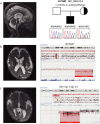Comprehensive genomic analysis of patients with disorders of cerebral cortical development
- PMID: 29706646
- PMCID: PMC6057976
- DOI: 10.1038/s41431-018-0137-z
Comprehensive genomic analysis of patients with disorders of cerebral cortical development
Abstract
Malformations of cortical development (MCDs) manifest with structural brain anomalies that lead to neurologic sequelae, including epilepsy, cerebral palsy, developmental delay, and intellectual disability. To investigate the underlying genetic architecture of patients with disorders of cerebral cortical development, a cohort of 54 patients demonstrating neuroradiologic signs of MCDs was investigated. Individual genomes were interrogated for single-nucleotide variants (SNV) and copy number variants (CNV) with whole-exome sequencing and chromosomal microarray studies. Variation affecting known MCDs-associated genes was found in 16/54 cases, including 11 patients with SNV, 2 patients with CNV, and 3 patients with both CNV and SNV, at distinct loci. Diagnostic pathogenic SNV and potentially damaging variants of unknown significance (VUS) were identified in two groups of seven individuals each. We demonstrated that de novo variants are important among patients with MCDs as they were identified in 10/16 individuals with a molecular diagnosis. Three patients showed changes in known MCDs genes and a clinical phenotype beyond the usual characteristics observed, i.e., phenotypic expansion, for a particular known disease gene clinical entity. We also discovered 2 likely candidate genes, CDH4, and ASTN1, with human and animal studies supporting their roles in brain development, and 5 potential candidate genes. Our findings emphasize genetic heterogeneity of MCDs disorders and postulate potential novel candidate genes involved in cerebral cortical development.
Conflict of interest statement
J.R.L. has stock ownership in 23andMe and Lasergen and is a paid consultant for Regeneron. J.R.L. is a co-inventor on multiple United States and European patents related to molecular diagnostics for inherited neuropathies, eye diseases, and bacterial genomic fingerprinting. The Department of Molecular and Human Genetics at Baylor College of Medicine derives revenue from the chromosomal microarray analysis (CMA) and clinical exome sequencing offered at Baylor Genetics (MGL;
Figures


References
Publication types
MeSH terms
Substances
Grants and funding
LinkOut - more resources
Full Text Sources
Other Literature Sources

